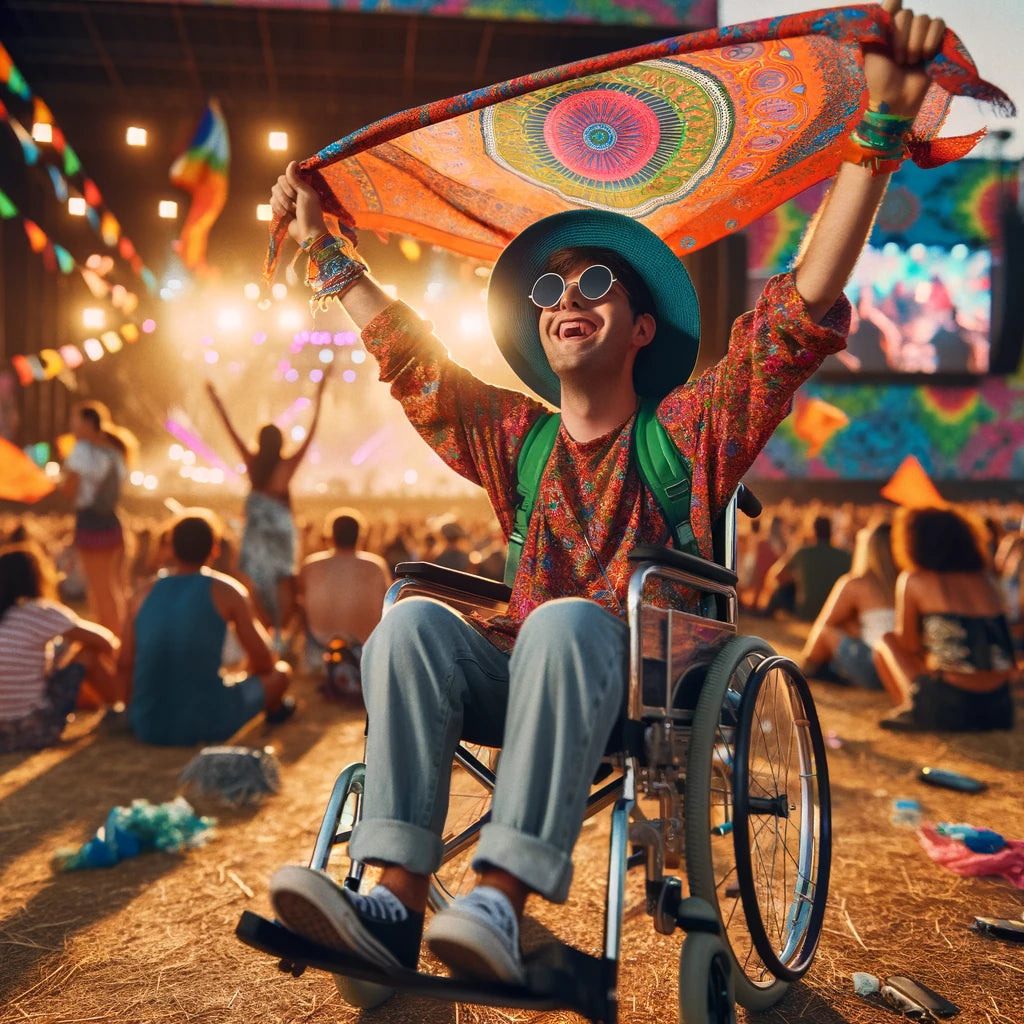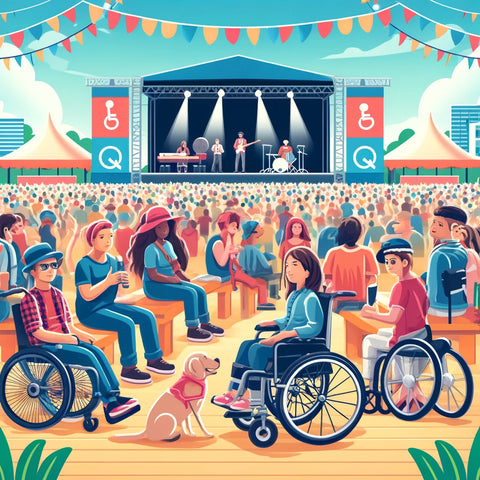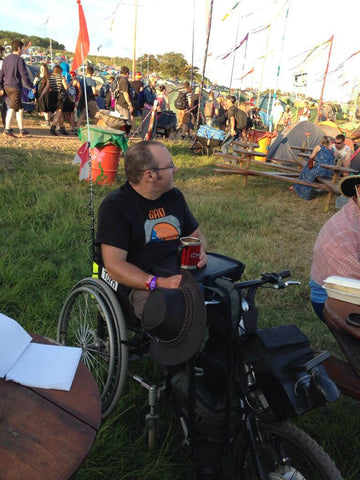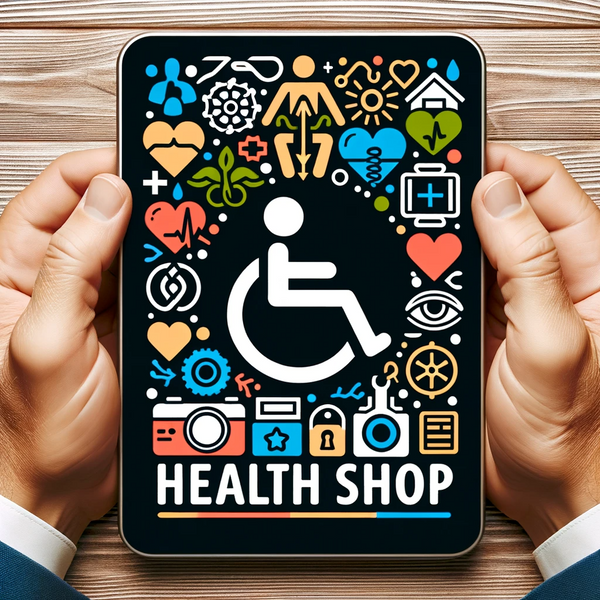
Disabled Persons Guide to Festivals
Share
Going to a festival with a disability should be exciting, and with the right planning, it can be great fun for everyone. This guide will help you think about things to plan, and take care of any extras you might need to do in advance. With a little extra planning you can get rid of any worries and enjoy the adventure, music and atmosphere, meet new people, and create happy memories of your festival experience
| Key Takeaways | Aspect | Details |
|---|---|---|
| Planning Ahead | Contact festivals | Accessibility info and specific accommodations |
| Transportation | Check options | Accessible parking and shuttle services |
| Navigational Aids | Utilize aids | Site maps and assistive devices |
| Health Management | Prepare for needs | Medical needs preparation and locating medical stations |
| Community Interaction | Engage with others | Organized meetups for interaction with other festival-goers |
Planning Your Festival Experience
When preparing to attend a festival, disabled people should first visit the event's website to understand the accessibility features available.
This can include information about special viewing platforms, accessible toilets, and paths that are wheelchair-friendly. Contact the festival organisers to discuss specific accessibility requirements and to ensure these are met upon arrival.
Find out if the festival offers disability passes or wristbands that provide access to special viewing areas, accessible camping, and other services.
Transportation and Parking
Disabled parking, find out where it is in relation to the site and whether you can book a space.
Buses and Trains: If you need a ride to the festival, it's a good idea to plan this early. Some festivals provide special shuttle buses that can take you from places where you can park or stay right to the entrance of the festival.
Wheelchair users can check if these are accessible. If possible book these buses before the festival to prevent any problems.
Navigation at the Festival
Navigating the vast spaces of a festival can be daunting. Therefore, having a clear understanding of the site's layout is crucial. Check if the festival provides detailed maps highlighting accessible routes.
Some festivals also offer personal navigational aids to help find stages, toilets/showers, and concession stands without hassle.

Managing Health and Medical Needs
Locate first aid stations and inquire about the storage of medications, availability of refrigeration, and electrical outlets for charging medical wheelchairs/devices if needed.
If you think it's necessary you could give medical staff information about specific health needs that you might require during the festival.
What to Pack: Essentials for Accessible Festival Fun
When packing for a festival, considering what will keep you comfortable and safe throughout the event is crucial. Below is a checklist tailored for disabled festival-goers:
Essential Items Checklist
- Wheelchair or Mobility Device: Ensure it is well-maintained and suitable for festival terrain. Consider extra batteries or a manual backup, and that you know where you can charge it if needed. Try to have a "Plan B" in case anything fails.
- Manual chairs might be better with solid tires rather than inflatable in case of punctures.
- Bring Documents or Disability Cards: Bring copies of any medical documentation and accommodation requests in case proof of disability is required to access services. For UK we recommend the Access Card.
- Preparing for the Elements
- Be ready for heat, cold, sun, dust, mud and other weather conditions. Bring layers, sunscreen, hats, bandanas, blankets, waterproof clothing and a brimmed hat or sunglasses for sunny days
A colourful sarong makes a handy sunshade/ towel/blanket/shawl all in one!
- For wheelchair users, consider attaching an umbrella or canopy for shade.
- Medication and Medical Supplies: Pack all necessary medications, along with a cool storage option if required. Include a basic first aid kit for minor emergencies
- Accessibility Gear: Portable ramps, seat cushions, or specialised ear protection can enhance your experience. Don’t forget any custom tools that assist with your mobility or comfort.
- Bring no water wipes for washing and keeping clean at the festival. We recommend Fresh Wipes.
Comfort at the Festival: Seating and Viewing
Finding a comfortable spot from which to enjoy the festival is paramount. Many festivals provide accessible viewing areas that offer excellent sightlines and are reserved for disabled attendees. Here’s how to make the most out of these amenities:
- Book in Advance: If the festival requires booking accessible viewing areas ahead of time, ensure this is arranged when purchasing your ticket
- Arrive Early: These areas can fill up quickly, especially before headline acts. Arriving early can secure you a prime spot
- Use Available Resources: Take advantage of the seating, shade, and any other comforts provided in these areas to make your stay more enjoyable. Consider renting a locker to store medical supplies and other equipment so you don't have to carry everything if they are available.
Drink and Eat Well!
When you go to a festival, it is important to keep your energy up. Here's how to stay hydrated and eat well:
Drinking Water
- Take a Camel pack or drinking bottle with a tube: This is a bag or bottle that holds water. You can wear it on your back or clip to a chair or in a bag at the back. It lets you drink water easily while you move around. This way, you don't have to push through the crowd to buy water. You can also save money!
Eating Food
- Bring your snacks: If you have special food needs, pack your own snacks. Some festivals let you bring your own food for health reasons.
-
Know about the food stalls: Learn about the food sellers at the festival before you go. This can help you find out:
- If they have food counters that are easy to reach.
- If they have food that fits your diet needs.
Wheelchair users can keep food and drink close at hand in the bag space of a trabasack lap tray.

Dealing with the Crowds and Noise - Sensory overload
For some people going to a festival can be tough with big crowds and loud noises. Here are some tips on how to deal with these challenges if you find them too much:
Moving Around in Crowds
- Plan Your Route: Before you go, look at the festival map. Try to find paths that are not too crowded. Some maps show special routes that are easier to use.
- Choose Less Busy Times: Try to walk around when it's not so busy. This might be early in the day or when most people are watching shows.
- Go With a Friend: It helps to go with someone who can help you move through the crowd and help you if you need it. Some festivals connect with organisations that provide "gig buddies" if you don't want to be alone.
Dealing with Too Much Noise
- Wear Noise-Canceling Headphones: These headphones help make things quieter. They are good to use when it is very loud or very busy.
- Find Quiet Places: Some festivals have quiet zones or sensory tents where you can take a break from the noise and bustle. Make use of these spaces to recharge.
- Bring Items That Help You Relax: Tinted sunglasses that dim the light, fidget toys, or weighted blankets can make you feel better and reduce the sensory overload.

Staying Safe and Secure
Safety is a priority at any large event. Here are some tips to help you stay secure and get help if needed:
- Emergency Contact: Have a clear plan for emergencies. Program your phone with all necessary contact information, including a friend's number, festival emergency services, and a personal emergency contact.
- Identification and Info Cards: Carry a card that lists your emergency contact information, any important medical information, and instructions for help in case you are non-verbal or need to communicate your needs quickly
- Locate First Aid Stations: Upon arrival, locate the first aid stations and any accessible help points. Knowing where these are can save time in case of an emergency.
Socialise!
Festivals are not just for fun and music; they're also a great place to meet new people and feel part of a community. Here are some ways you can connect with others at a festival:
Meet the Community
- Join Disability Meetups: Many festivals have special gatherings for disabled attendees. These meetups are a good chance to meet people who understand what it's like and make new friends.
- Use Social Media: Before the festival starts, join groups on social media related to the festival. People often talk about the festival, plan meetups, and share helpful tips there.
- Take Part in Events: Look for workshops, talks, and other activities at the festival that are either made for disabled people or are welcoming to everyone. These can be good opportunities to learn new things and meet people.
By getting involved in these ways, you can enjoy the festival more and feel a stronger sense of being part of a community.
Celebrating Diversity and Advocacy
- Inclusion Activities: Look for festivals that celebrate diversity through advocacy booths, parades, and showcases that highlight the contributions of disabled individuals to the arts and community.
All Festivals are different - some need improvement
Remember, every festival is different, and accessibility can vary. Continuous communication with festival organizers, even after the event, plays a crucial role in enhancing accessibility for all.
Feedback and Advocacy: Your feedback can help improve festival accessibility. Engage with event organisers to share your experiences and suggest improvements for future events.
Thank you for following this guide on making festival experiences accessible and enjoyable for disabled attendees. We hope these tips will help you confidently navigate and enjoy your next festival!
Festival Checklist for Disabled People
Here's a printable checklist in a table format for disabled people planning to attend a festival. Click here for a pdf that is easy to print and check off each item as you prepare:
Festival Accessibility Checklist for Disabled Attendees
| Task | Details | Done (✓) |
|---|---|---|
| Research Accessibility | Check the festival's website for accessibility info. | [ ] |
| Contact Organisers | Discuss specific needs like sign language services or accessible viewing areas. | [ ] |
| Book Accommodations | Arrange accessible accommodation near the venue if needed. | [ ] |
| Transport Arrangements | Plan accessible transport to and from the festival. | [ ] |
| Mobility Aids | Check all mobility aids and pack spare parts/tools. | [ ] |
| Medication and Health Supplies | Bring all necessary medications and health supplies, stored appropriately. | [ ] |
| Comfort Items | Pack items to manage sensory overload (e.g., noise-cancelling headphones). | [ ] |
| Weather-Appropriate Clothing | Prepare for all weather conditions with appropriate clothing and accessories. | [ ] |
| Check-in at Accessibility Services | Visit the accessibility services booth upon arrival at the festival. | [ ] |
| Familiarise Yourself with Layout | Locate essential services like first aid and quiet zones. | [ ] |
| Hydration and Nutrition | Stay hydrated and bring snacks, especially if dietary restrictions are a concern. | [ ] |
| Emergency Plan | Have an emergency contact plan and keep medical information accessible. | [ ] |
| Connect with Others | Engage with community through forums or meetups. | [ ] |
| Feedback | Provide feedback to organisers after the event to improve future accessibility. | [ ] |
Instructions for Use:
- Print out the checklist.
- As you complete each task, tick the box under "Done (✓)".
- Keep this checklist handy as you prepare for and attend the festival to ensure all needs are met.
This checklist serves as a comprehensive guide to help ensure that all necessary preparations are made for a safe and enjoyable festival experience.
Planning a Festival or Event and want to be inclusive? Here are our tops suggestions:
Involve the Disability Community in Planning
- Include disabled people on advisory boards, as consultants, staff, volunteers, and artists to get their perspectives and expertise
- Reach out to local disability organizations to spread the word about your event's accessibility
Provide Detailed Accessibility Information
- Have a dedicated accessibility page on your website with information about accommodations, services, and how to request them
- Provide contact info for an accessibility coordinator who can answer questions
- Make accessibility info available in multiple formats like large print, braille, audio, etc.
Train Staff and Volunteers on Accessibility
- Educate all staff and volunteers on how to respectfully assist disabled attendees
- Have a designated accessibility team who are knowledgeable about the accommodations and services available
Offer a Range of Accommodations
- Provide ASL interpreters, captioning, audio description, sensory-friendly spaces, quiet areas, accessible restrooms, etc.
- Have assistive listening devices, wheelchairs, and mobility scooters available to borrow
- Ensure accessible transportation and parking options
Design for Accessibility from the Start
- Consider accessibility when selecting the venue, planning the layout, and designing the stages, booths, etc.
- Provide accessible seating and viewing areas with unobstructed sightlines
- Ensure pathways are smooth, wide, and free of obstacles
Promote Your Accessibility
- Highlight your accessibility accommodations in marketing materials to attract the disability community
- Partner with disability organizations and influencers to spread the word
- Showcase disabled artists and performers in your lineup
Get Feedback and Keep Improving
- Provide an accessibility feedback survey after the event to see what worked and what could be better
- Make improvements each year based on feedback and new best practices
- Aim for continuous progress in making your event welcoming and accessible to all
The key is to be proactive, thoughtful, and inclusive in your accessibility planning. By involving the disability community, offering comprehensive accommodations, and designing with accessibility in mind from the start, you can create a festival experience that everyone can enjoy. Accessibility benefits us all.
